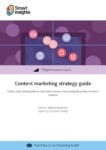The must-know content marketing statistics to benchmark your plans against this year
Content marketing is still very much at the heart of digital marketing, with content continuing to be a vital tactic for bringing in traffic and encouraging conversions.
However, content marketing has moved past blogs and now encompasses so much more. The industry is also more competitive than ever, with content being produced on masse, making it harder to ensure yours stands out.

In order to be successful at content marketing, you need to ensure that you’re taking into account more technical aspects – such as SEO – but also that you’re effectively battling for consumers’ attention. It is this battle that has led content to change at a rapid pace, with competition leading to increased levels of innovation.
This is why you need to stay on top of the latest trends and advances in the content marketing arena. With this in mind, here are some of the latest content marketing statistics that could help shape your strategy.
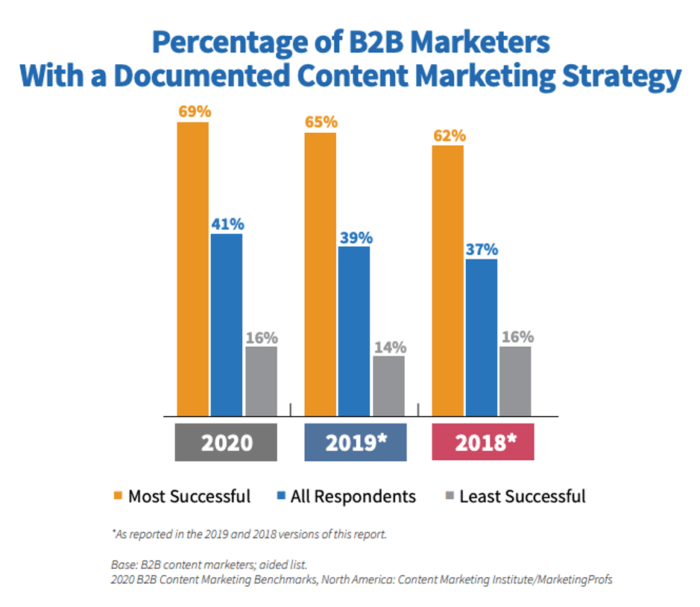
69% of B2B marketers have a documented content strategy
More B2B marketers than ever before are documenting their content strategies, with 41% saying this is the case this year. This figure has been increasing slightly over the last couple of years, rising from 39% in 2019 and 37% in 2018.
However, what’s really interesting is the fact that a documented content marketing strategy seems to be linked to success. When looking at B2B marketer with successful strategies, 69% document them compared to just 16% of the companies who are least successful with their marketing.
This suggests that failing to plan really does mean you’re planning to fail when it comes to content marketing.
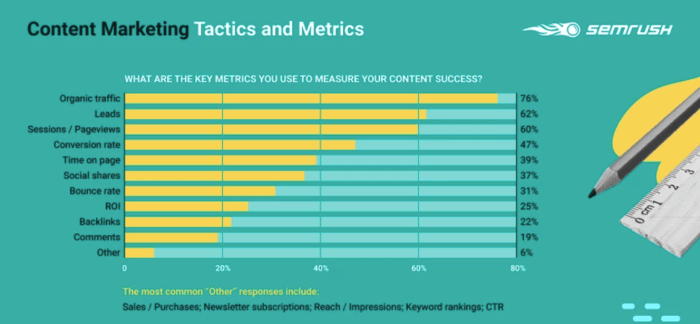
76% of marketers use organic traffic as a measure of content success
Organic traffic and the positive impact on SEO are the main measures of content marketing success for businesses. Some 76% of marketers said that organic traffic is the key metric they use to measure the success of their content, showing that although other channels are driving traffic, organic is still very much king when it comes to content.
However, the quality of this traffic is not the second metric used to measure success. Instead, 62% said that the number of leads they get is a sign that their content is working. This is compared to the 60% who look at sessions and pageviews – signs of good engagement - and the 47% who use conversion rate as a key content success metric. Bounce rate is also low on the list, with just 31% naming it as a metric.
It is worth remembering that while content may rank well, it may not bring in the right traffic or qualify your leads. Looking at the quality of the traffic you’re attracting with your content marketing efforts and how many visitors are ultimately converting will give you a better indication of whether your content strategy is hitting the mark.
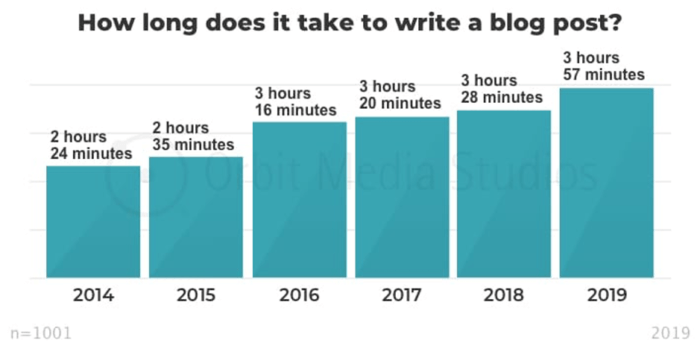
It takes 65% more time to write a blog than in 2014
It is now taking more time to create blogs, with the average writing time in 2019 hitting three hours and 57 minutes – a 65% increase from 2014’s two hours and 24 minutes. This suggests that content marketers are reacting to the needs of consumers, with both length and quality becoming a lot more important.
Last year saw 19% of bloggers spending six hours or more writing blogs, whereas, in 2014, just 4.6% said the same. This could well be due to the fact that there is more competition, which means blogs need to be as informative and researched as possible to stand out, as well as the extra requirements in order to get content to perform well in SERPs.
Ultimately, this means that companies should be putting the focus on the quality of content rather than the number of blogs being created. This will ensure that you benefit from evergreen content but also that you end up with blogs that can be used across various channels and in multiple ways.
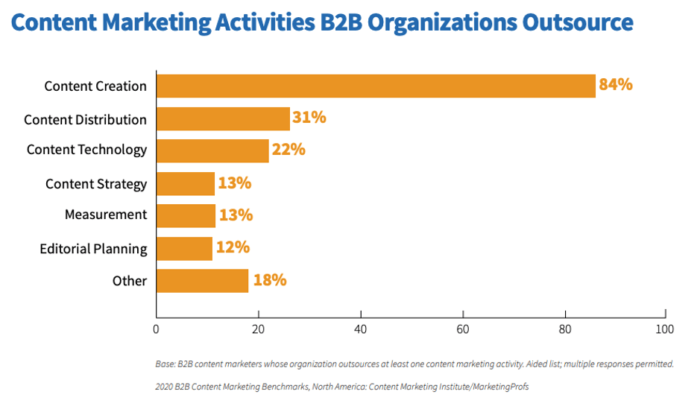
84% of B2B marketers are outsourcing content creation
The fact that blogs now take so much time to create could be a factor in the decision for many organizations to outsource content creation. In B2B companies, 84% of marketers outsource their content creation activities, suggesting that fewer businesses are opting to have any content capabilities managed in-house.
Download our Individual Member Resource – Content marketing strategy guide
This guide shows you both how to develop a strategy to deploy content across all your online marketing and gives practical tips to make it happen.
Access the Content marketing strategy guide
This outsourcing is regardless of company size, the budget for content marketing and the overall success of a company’s content marketing efforts, showing that it is a trend across the board. This means that while many businesses may be able to create content in-house, they are choosing not to.
While this is good news for agencies offering content marketing services, it does suggest that there are opportunities for companies to be more reactive by taking on more content creation responsibilities. Producing content related to the latest news – for example – can help show your business has its finger on the pulse, even if other content types are outsourced. Looking at ways to combine both in-house and outsourced content creation could offer a range of benefits.
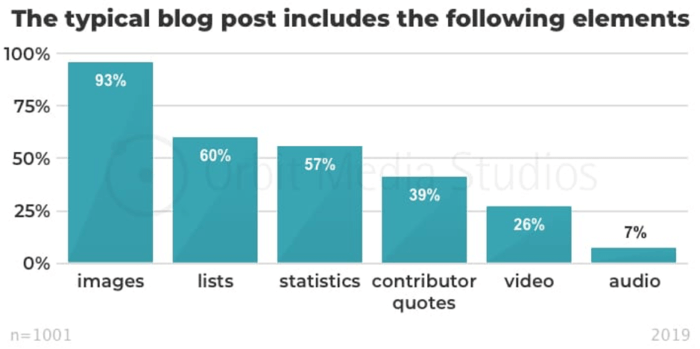
26% of blogs include videos but 41% of bloggers report strong results from videos
Content is no longer about written content. Consumers want variety and content that is easy to consume, which is why video marketing is growing at such a fast rate. This means that blogs need to offer more in order to capture and hold people’s attention and increases the chances of them ultimately converting.
However, different elements don’t always deliver the same results – even if they are popular among content creators. For example, although 93% of blogs contain images, only 30% of bloggers say they get “strong results” from this content format.
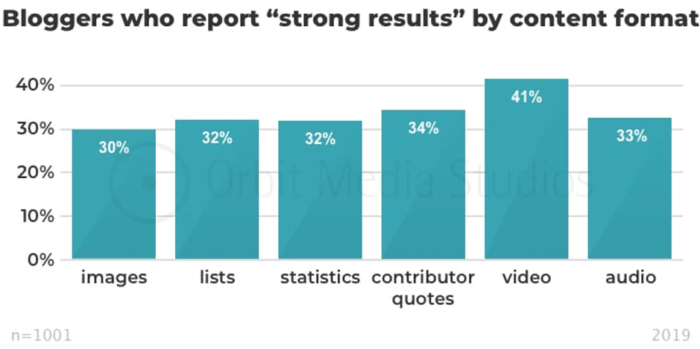
In comparison, 26% of blogs contain videos, which 41% say deliver strong results. On top of this, just 7% of blogs contain some form of audio content – such as podcasts – however, a third (33%) of bloggers say this is effective, showing that alternative forms of content need to be included in your content marketing strategy.
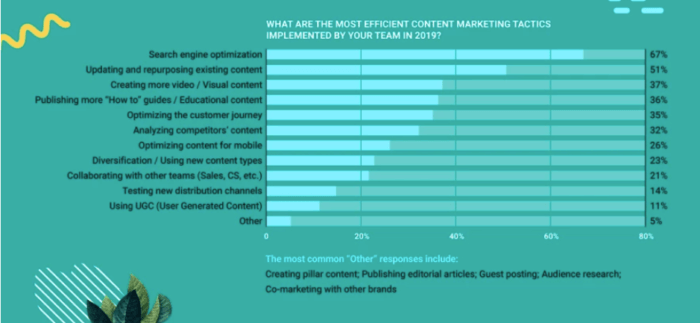
67% of marketers say SEO is the most effective marketing tactic
Despite alternative content delivering strong results, the most efficient content marketing tactic continues to be search engine optimization. Around 67% of marketers say that SEO was the most efficient tactic that was implemented last year, and it is likely that this will continue into 2020.
However, with changes to Google’s organic search algorithms - such as the BERT update – succeeding at SEO is likely to become more difficult. This means that your content marketing strategy should encompass a lot more than just SEO.
Other tactics that proved to be particularly successful last year that marketers should bear in mind for 2020 included updating and repurposing existing content (51%), creating more video/visual content (37%) and optimizing the customer journey (35%).







